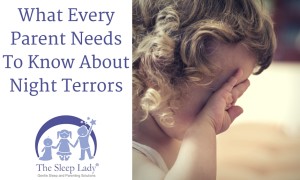Night terrors are something that no parent wants to deal with. They’re sudden, loud, scary, and often start and stop without warning. Thankfully, they’re likely more frightening for you than for your child, though it’s quite scary hearing your child scream awake shortly after falling asleep.
Often, children experiencing a night terror are screaming, and seem frightened, and that is something that no one wants to deal with.
And then there’s the question of whether or not what your child is experiencing is actually a night terror and not just a nightmare. So how do you know the difference?
 What Is A Night Terror?
What Is A Night Terror?
- Night terrors usually occur in the first two hours after falling asleep.
- Children experiencing night terrors will appear to be awake and upset, but they are usually asleep, though not dreaming.
- Night terrors can last anywhere from 5 to 25 minutes, during which the child is inconsolable.
- Sweating and elevated heart rate are not uncommon during a night terror.
- Night terrors occur during NON-REM sleep (when your child is coming out of deep sleep).
Interestingly, nightmares usually occur later in the night or even the early morning.
What Causes A Night Terror?
The number one cause of night terrors is not surprising, when you consider that sleep deprivation (or going to bed too late) can cause your child’s sleep patterns to become disrupted. This can also be affected by schedule changes, travel, illness, sleep apnea, or even developmental milestones.
If you have a little boy (or a few), you’ll want to know what to watch for, as night terrors are more common in boys, though they only occur in 5% of children. And, if you have heard stories about your childhood where you woke screaming, your children are far more likely to experience night terrors (and so are you).
Night terrors often occur suddenly, but if they are occurring on a semi-regular basis (2 to 3 times a week), then you may need to make some changes to your child’s routine.
Can You Stop Night Terrors?
It is possible to help your child stop having night terrors, but you need to do a little work.
- Start by moving their bedtime a bit earlier-even if that means just 15 to 30 minutes each night. Those few extra minutes may be enough to stop the night terrors altogether.
- Keep a log of when the night terrors happen (time, date, etc.). Log what time you think your child fell asleep and what time they have the night terror.
- Once you’ve determined the frequency and verified that your child is in fact waking within 2 hours of falling asleep, you can take action.
- Gently wake your child 15 minutes prior to when the night terrors usually occur. You don’t need to wake them fully, but make sure they shift position, roll over, or even mumble in their sleep. You’ll need to do this for about 10 days to break the cycle.
Occasional night disruptions are a normal part of childhood. Remember to provide support and reassurance when necessary. Your child may not realize that they are having disrupted sleep, so they may be far more tired or cranky during the day.
You can combat this by moving their bedtime a bit earlier-even if that means just 15 to 30 minutes each night. Those few extra minutes may be enough to stop the night terrors altogether.
Should I Talk To My Child About Night Terrors?
 Night terrors can be terrifying for parents, but likely, your child won’t remember anything in the morning. It is recommended that you not bring up the night terror, as your child may be confused or it may cause them anxiety.
Night terrors can be terrifying for parents, but likely, your child won’t remember anything in the morning. It is recommended that you not bring up the night terror, as your child may be confused or it may cause them anxiety.
Additionally, avoid scary television shows, movies, and books before bed. Aim to have your child in bed and falling asleep at a reasonable hour. If you don’t know what that means, I suggest you review this information on typical bedtime schedules as they will be helpful in this.
Should your child have a night terror, it’s perfectly fine to be in the room to monitor them and keep them safe, but avoid waking them or interfering as this can prolong the terror. Unfortunately, they just need to get through it.
On the other hand, if your child is having nightmares, it is definitely something you want to talk about. You may be surprised by what you learn from your child about the trigger, which may give you ideas to help your child avoid having nightmares on a regular basis. Link to the bedtime routine article that talks about the dreamcards yup!
If you’ve tried to help your child through their night terrors, and they do not seem to be improving, it would be prudent to speak to their pediatrician for help.
Lully, the company behind the Lully Sleep Guardian, the first device to stop night terrors, is launching a new product February 9. Stay tuned! In the meantime, visit www.lullysleep.com to learn more about night terrors and their device.






